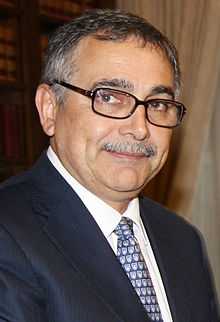René Castro

René Castro Salazar (b. Saint Louis, Missouri, United States of America, August 25, 1957), is a Costa Rican politician.
He was appointed by president-elect Laura Chinchilla as minister of foreign affairs on 2 March 2010. He served in that position from inauguration day (8 May),[1] replacing Bruno Stagno Ugarte. He was replaced in this position on 1 August 2011 by Enrique Castillo, former ambassador to the Organization of American States. Castro continued serving as minister of the environment and energy.
Education
Castro holds Master's and PhD degrees from Harvard University, with an emphasis on Natural Resource Economics and Sustainable Development. He also holds a degree in civil engineering from the University of Costa Rica.[2]
Political career
Minister of foreign affairs
On 2 March 2010, president-elect Laura Chinchilla informed the media that Castro would serve as Minister of Foreign Affairs from 8 May 2010 (inauguration day). He remained in that position until 1 August 2011.
Castro's role in Foreign Affairs was surrounded by controversy. Critics contended that foreign policy under his oversight was very low-profile, unlike that of his predecessor. The document containing the blueprint for Laura Chinchilla's administration, for instance, devoted just three pages to foreign affairs issues. During his tenure, Castro was also confronted by a legal action filed by employees of the Ministry of Foreign Affairs who accused him before the Procuraduría de Etica of appointing 27 diplomats who were connected with his party, but lacked the qualifications for the posts.[3] Moreover, Castro was confronted by the crisis of Isla Calero, which both Nicaragua and Costa Rica claim to be part of their territory. Castro's policy towards Nicaragua on this issue was criticized as an appeasement approach that did not work and encouraged Nicaragua's president Daniel Ortega to pursue an aggressive policy against Costa Rica.[4]
Castro began negotiations for a concordat with the Vatican. This was strongly criticized by observers who contended that it was a low priority. The previous concordat, which was abrogated during the nineteenth century, was signed in 1852. Thus, for the most part of its republican history, Costa Rica had not had a need of such a treaty with the Vatican. Critics pointed out that granting favourable treatment to the Catholic Church is inherently unfair and anti-democratic, given the large minority presence of other Christian denominations in Costa Rica.[5] Others stated that the committee representing Costa Rica in the Vatican negotiations included Hugo Barrantes, a Costa Rican bishop. It was argued that Barrantes' allegiance would lean towards the Vatican, and not the Costa Rican government, raising doubts about Castro's leadership concerning Costa Rica's foreign affairs.[6]
Minister of Environment and Energy
On 1 August 2011, Castro was appointed Minister of Environment and Energy, a position he already held during the Olsen administration (1994–1998). On his first day in office, Castro issued a moratorium on oil exploration for the following three years.[7]
Other political posts
Castro has also been deputy minister of the Interior and Police, and President of San José City Council. He has also served as Secretary General of the National Liberation Party.
Books
- "Evaluación de Proyectos Ambientales"
- "Evaluación de Impacto Ambiental y Sostenibilidad del Desarrollo"
- "Valoración de los servicios ambientales del Bosque: El Caso de Cambio Climático"
See also
References
- ↑ http://www.nacion.com/2010-03-02/ElPais/UltimaHora/ElPais2287364.aspx
- ↑ René Castro Inter Press Service. Retrieved: 2013-10-31.
- ↑ [http://www.nacion.com/2011-08-07/ElPais/cancilleria--de-la-tormenta-de--castro-a--la-calma-de-castillo.aspx Cancillería: de la tormenta de Castro a la calma de Castillo (Spanish)
- ↑ Excanciller Bruno Stagno se lanza contra René Castro (Spanish)
- ↑ ¿Queremos un concordato nuevo con Vaticano? (Spanish)
- ↑ Rodolfo Cerdas Opinion/ojo-crítico (Spanish)
- ↑ Costa Rica Decrees Moratorium On Oil Exploration